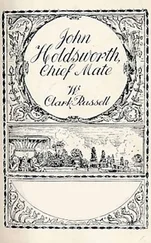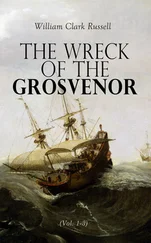Facing her sits a young man, broad-shouldered and bronzed, with large lustrous black eyes and dark wavy hair. He wears a pilot cloth coat and black trousers, bell-mouthed at the feet, and a plain silver ring upon his left hand.
Close beside him, on a low chair, sits a young girl, with a sweet and modest face, and bright yellow hair which shines in the lamplight like gold, and blue eyes filled now with tears.
So they sit, so they have sat, for many minutes in silence, and nothing is heard but the ticking of the clock on the mantelpiece, or the awkward moth that hits the ceiling, or now and again the melancholy plaint of some dreaming or belated bird from the dark country that stretches outside like a vision under the throbbing starlight.
Presently the old lady, lifting her head, says:
“I don’t think it pleases God that people’s hearts should be sorrowful. Nothing should grieve us but the fear of His anger; and if there be truth in religion, and any wisdom in human experience, there is nothing in this world that should make us sad.”
The girl presses her hand to her eyes, and answers in a broken voice:
“John and I have never really been parted before.”
“We never can be parted, Dolly, my sweet little wife,” says the young man. “There was a fear of parting before, but none now, dear one. I am only leaving you for awhile—and that is not parting, is it, grandmother? Parting is separation, and those whom God has joined cannot be parted, cannot be parted, my Dolly!”
“Ay, that is right!” exclaims the old lady. “John is only leaving you for awhile—you cannot be parted—remember that.”
“But it is to be a long while, and my heart will be so lonely without him, granny.”
The old lady gives her head a dispirited shake.
“It is all going and coming in this world,” says she. “To-day here, to-morrow there: ’tis like breathing on a mirror.”
“No, no!” cries the young fellow, “that is a melancholy simile. Life is something more than a breath. I would be content to know nothing but its sorrows, rather than think it the hollow illusion people call it. Oh, Dolly, you must cheer up and help to give me heart. I want all the courage I can get. After this voyage we needn’t be separated any more. Remember, next year I shall be skipper, and then I can take you to sea with me.”
“If next year had only come!” the poor little girl sobs, and lets her face fall upon her husband’s hand.
“Nay, nay,” the old lady chides, gently, “’tis thy business to help and support thy husband, Dolly. Will tears help him? Resolution is softened by them, and made weak and womanish. Your mother before you, my child, knew what it was to part from your father. He once went to Spain, and for many months we knew not whether he was living or dead. You were a little child then. What came to her, came to me, and must come to you as it comes to all women who will needs transplant their own hearts into men’s. Know this, Dolly, that no love is purely sweet that has not known trials and afflictions.”
“Hear that, my little one,” says the young husband, stooping his head until his lips touch his wife’s ears. “Let us seek a blessing in our grief, and we shall find one. It teaches me to know my love for you—our love for each other. Is not such knowledge blessed?”
“See here, Dolly,” continued the grandmother, battling with the tears provoked by the influx of hurrying memories which followed her reference to her own child, Dolly’s mother. “When John is gone, we will put up a calendar against the wall in your bedroom; and every night, after we have worshipped God, we will prick off a day, and you shall see how quickly the calendar grows small under our hands. I am seventy years old, and it was but the other day that I was dancing your mother in my arms, and I was a young woman, and your grandfather a hearty man, with brown hair under his wig, and bright big eyes like yours. Why, that was fifty years ago, and it seems but yesterday! Many’s the bitter tear I have shed, and the grief I have borne; but the times I mourn cannot come back to me, they are gone for ever—my life is but an empty chamber now; there is no fire in the grate, and the chairs are vacant, and I feel so lonely that I sometimes wish I was dead. But what is your grief? It is but a few months’ separation, and every day that dies will give you happiness. It is not so with others, nor with me—no! no!”
As the old grandmother spoke, with some perception, perhaps, of that rather discreditable characteristic of human nature which finds the best solace for its own trouble in the consolation that is wrought out of the griefs of others, the girl gradually raised her head and fixed her eyes wistfully on her husband’s, then laid her cheek against his shoulder, as a child would whom its tears have worn out.
“Grandmother,” said the young man, “I leave my Dolly to your care, and I know you will love and cherish her as though you were sure that any ill that came to her would break my heart.”
“She cannot be dearer to me than she always was,” answered the old lady, solemnly; “but be sure, John, that I’ll take extra care of her, since her preciousness is doubled by being dear to you and having your life bound up in hers.”
“And you will keep her heart up with happy thoughts of me, grandmother,” continued the young fellow, his dark eyes made infinitely tender by the shadow of tears, “and bid her remember that when the wind blows here it may be a summer calm where I am, and blue sky when there are thunderstorms here. You’ll remember this, Dolly?”
“Yes, John.”
“The calendar is a good thought of grandmother’s. Or you may watch the flowers, Dolly; you’ll see them fade away and leave the ground bare. By-and-by they’ll spring up again, and they will be a promise that I am coming back to you—coming quickly—quick as the wind will blow me—back to my little wife, to my sweet wife, Dolly.”
She sobbed quickly with renewed passion, and clasped his hand.
There was a childlike beauty in her face that made her sorrow infinitely touching for him, who loved her with all the strength of his great heart, to behold. He looked wistfully at the old grandmother; but she, more powerless than he, was brooding over the to-morrows which were to come when he should have gone away and left her alone with Dolly’s grief.
“I have a mind,” she said at last, “to send for Mr. Newcome, the rector. He should be able to point out to Dolly better than either of us can, that there is something unrighteous in suffering our hearts to be overcome by any dispensations God in His wise providence may choose to ordain.”
“No, I don’t want Mr. Newcome,” sobbed Dolly. “I must cry, granny. When John is gone, I’ll dry my eyes, and think of nothing but the time when he is to come back to me. But whilst I see him, and know that this time to-morrow he will be gone, I can’t help crying, indeed I can’t, granny.”
“Ay, my dear, but if your tears could bind him to you, and take the place of his duties which summon him away, they would be very well. But it is your place to help him in his troubles, as it is his to help you in yours; and see what a lonesome air his face has as he watches you, because he feels himself away from you by your refusing to listen to the words he tries to comfort you with.”
“I would give my right hand to save Dolly from these tears, grandmother,” said John, “but it is her love that frets. By-and-by her eyes will grow bright, for she will know that every hour which passes after I have left her is bringing us nearer to next summer, when we shall be together again.”
“But a year is such a long time,” wailed Dolly. “It is four times over again the months we have been together, and it seems ages ago since you came home, John. And granny doesn’t know the dangers of the sea. You have never talked to her as you have to me. Haven’t you told me of shipwrecks, and how men fall overboard, and how some ships catch fire and not a creature saved of all a great ship’s crew?”
Читать дальше












